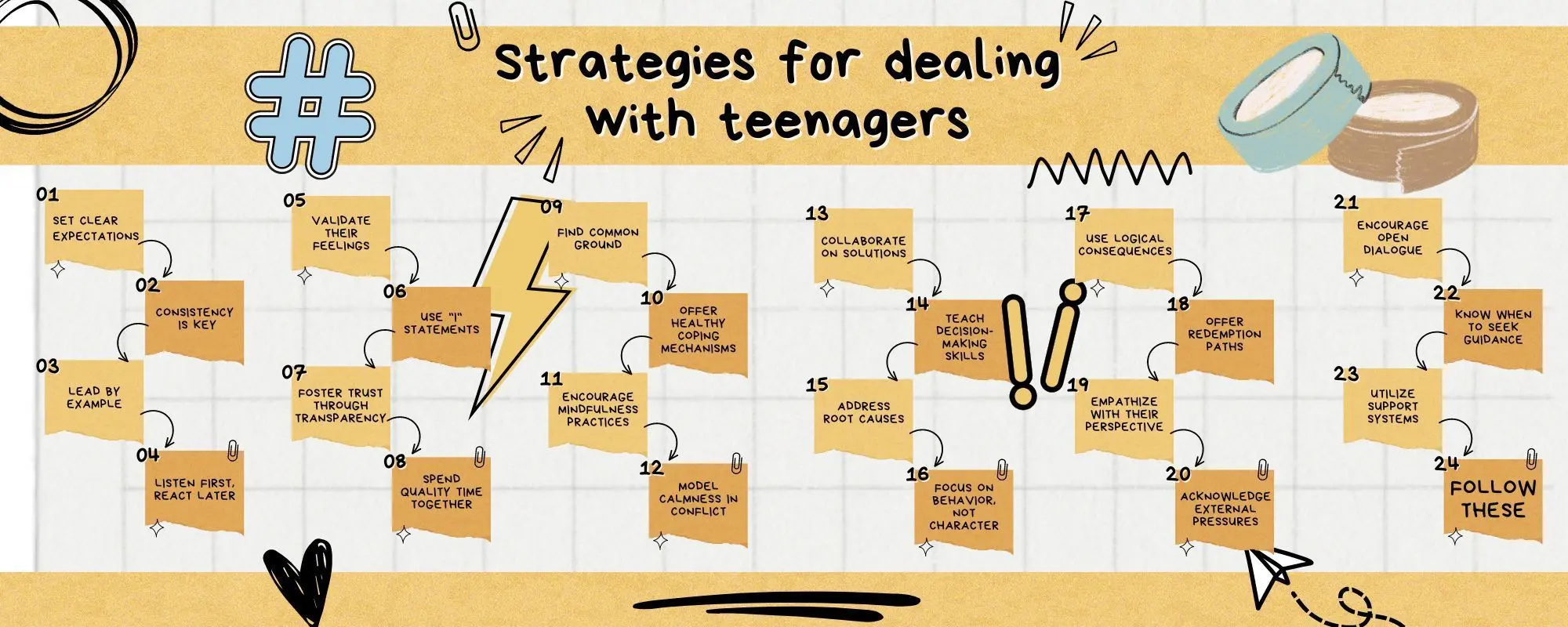Learn 20+ ways to handle teens who talk back. Get practical advice on dealing with teenagers and fostering a respectful and positive home environment.

Dealing with teenagers who talk back is a common challenge many parents face. Studies show that nearly 60% of parents report frequent backtalk from their teens. This behavior often stems from the natural developmental need for independence and can strain family relationships.
Effectively dealing with teenagers who talk back is crucial for maintaining a respectful and harmonious home environment. This blog will provide ten practical tips to help parents navigate this difficult phase, promoting better communication and mutual respect within the family.
Stay tuned as we delve into strategies that can transform your interactions with your teenager and foster a more positive family dynamic.
Here are Strategies for dealing with teenagers

- Set Clear Expectations: Like signposts on a winding road, clear boundaries provide direction and security. Clearly communicate your expectations regarding behavior and consequences. For example, “In our family, we treat each other with respect. Disrespectful language or yelling is not acceptable.”
- Consistency is Key: Teenagers are experts at testing boundaries. Stay consistent in enforcing rules and consequences to avoid confusion and resentment. For instance, if you’ve set a curfew, consistently enforce it regardless of the circumstances.
- Lead by Example: Remember, your teenager is watching your every move. Model the behavior you wish to see, including respect, empathy, and effective communication. If you expect them to listen when you speak, show them the same courtesy when they talk to you.
- Listen First, React Later: When emotions run high, it’s tempting to jump in with a response. Instead, practice active listening when dealing with teenagers. Hear them out without interrupting, and then respond calmly. For instance, “I understand that you’re upset. Can you tell me more about what’s bothering you?”
- Validate Their Feelings: Empathy goes a long way in defusing tense situations when dealing with teenagers. Acknowledge their emotions, even if you don’t agree with their perspective. Say something like, “I can see that you’re frustrated. It’s okay to feel that way.”
- Use “I” Statements: Encourage open dialogue by expressing your thoughts and feelings using “I” statements. For example, “I feel hurt when you speak to me that way.” This approach encourages them to take responsibility for their actions without feeling attacked.
- Foster Trust Through Transparency: Keep the lines of communication open by being transparent and honest with your teenager when dealing with teenagers. Avoid hidden agendas or secrets that can erode trust. Share your experiences and decisions openly, such as explaining why certain rules are in place.
- Spend Quality Time Together: Quality time doesn’t have to be extravagant when dealing with teenagers. Whether it’s cooking dinner together or going for a walk, prioritize one-on-one time to strengthen your bond. Find activities that both of you enjoy and make them a regular part of your routine.
- Find Common Ground: Discover shared interests or hobbies that you can enjoy together when dealing with teenagers. Building common ground fosters connection and understanding. Whether it’s watching a favorite TV show together or playing a sport, find activities that you both enjoy and make time for them regularly.
- Encourage Mindfulness Practices: Help your teenager develop emotional resilience by introducing mindfulness practices such as deep breathing or meditation. Share techniques that have worked for you and encourage them to practice regularly, especially during stressful times like exams or social events.
- Offer Healthy Coping Mechanisms: Equip them with healthy coping mechanisms to manage stress and frustration when dealing with teenagers, such as journaling, exercising, or listening to music. Encourage them to find activities that help them relax and unwind, and remind them that it’s okay to take breaks when they need them.
- Model Calmness in Conflict: During heated moments, be the calm in the storm when dealing with teenagers. Show them how to navigate conflicts with grace and composure. For example, if they’re upset about a disagreement with a friend, model active listening and problem-solving skills by asking open-ended questions and offering support.
- Collaborate on Solutions: Involve your teenager in problem-solving discussions. Encourage them to brainstorm solutions and weigh the pros and cons together when dealing with teenagers. For example, if they’re struggling with time management, sit down together and create a schedule that works for both of you.
- Teach Decision-Making Skills: Empower your teenager to make informed decisions by teaching them critical thinking and problem-solving skills when dealing with teenagers. Encourage them to consider the consequences of their actions and weigh their options carefully before making a decision.
- Address Root Causes: Look beyond surface-level behavior to identify underlying issues or triggers when dealing with teenagers. Addressing root causes allows for more effective solutions. For example, if they’re acting out because of stress at school, work together to find ways to reduce their workload or manage their time more effectively.
- Focus on Behavior, Not Character: When addressing misbehavior, focus on the action, not the character of your teenager when dealing with teenagers. Avoid labeling or making personal attacks. Instead of saying, “You’re so lazy,” try saying, “Leaving your dirty dishes in the sink is not acceptable behavior.”
- Use Logical Consequences: Connect consequences to the misbehavior in a logical and meaningful way when dealing with teenagers. For example, if they fail to complete chores, they lose privileges like screen time or going out with friends. Be consistent in enforcing consequences to reinforce the message.
- Offer Redemption Paths: Everyone makes mistakes. Provide opportunities for your teenager to make amends and learn from their errors when dealing with teenagers. For instance, if they break a house rule, give them a chance to apologize and make things right. Encourage them to reflect on what they could have done differently and offer support as they work to improve.
- Empathize with Their Perspective: Put yourself in their shoes and try to understand the world from their perspective when dealing with teenagers. Empathy builds bridges and fosters mutual respect. If they’re upset about a disagreement with a friend, validate their feelings and offer support without jumping to solutions.
- Acknowledge External Pressures: Recognize that teenagers face a myriad of external pressures, from academic stress to peer pressure when dealing with teenagers. Acknowledging these challenges validates their experiences and helps them feel understood. For example, if they’re feeling overwhelmed by schoolwork, offer support and encouragement rather than dismissing their concerns.
- Encourage Open Dialogue: Create a safe space for your teenager to express themselves without fear of judgment when dealing with teenagers. Encourage open dialogue by listening attentively and withholding criticism. Ask open-ended questions and show genuine interest in their thoughts and feelings.
- Know When to Seek Guidance: There’s no shame in seeking outside help when faced with challenges beyond your expertise when dealing with teenagers. Consult with a therapist or counselor if you’re struggling to navigate difficult issues. For example, if your teenager is showing signs of depression or anxiety, seek professional help to ensure they get the support they need.
- Utilize Support Systems: Lean on friends, family, or support groups for guidance and encouragement when dealing with teenagers. You’re not alone in this journey, and support is readily available. Reach out to trusted individuals who can offer advice, empathy, and a listening ear.
Conclusion
In the tumultuous journey of parenting a teenager, remember that every challenge is an opportunity for growth when dealing with teenagers. By implementing these expert tips, you can foster a strong and healthy relationship with your teenager built on respect, trust, and open communication. Embrace the journey, celebrate the victories, and never underestimate the power of love and understanding when dealing with teenagers.

Share your experiences and tips for dealing with teenagers in the comments below. Stay tuned for more resources and insights on parenting and communication. Together, we can navigate the teenage years with grace and resilience.
You may also be interested in : Adolescents and Social Media: Parental Challenges and Opportunities in 2024